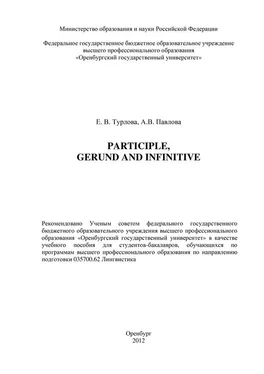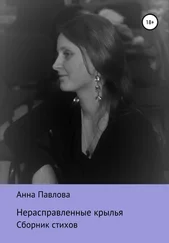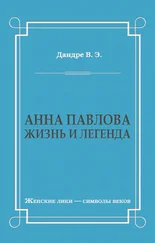Exercise 4. Translate what is given in brackets using participle I in the appropriate form.
1. (Закрыв) the door with only the lightest slam, they went out together. 2. Julia sat eating rolls and drinking coffee in her room next morning, (думая) what she should do. 3. "Come along, quickly," said Nick (держа) the door of the driving cabin, "you're coming too." 4. He got up from his chair and (подойдя) to a shelf brought me a large album. 5. I kept silence for a while, (думая) of what Stroeve had told me. 6. When she had finished she sat (уставившись) in front of her for some minutes.
2.4 Syntactic functions of Participle I
Participle I has the following functions in the sentence:
1) an attribute:
Here is the telegram announcing his arrival. Вот телеграмма, извещающая о его приезде.
• Не came up to the crying child. Он подошел к плачущему ребенку.
2) an adverbial modifier:
a) of time:
As an adverbial modifier of time participle I may be preceded by the conjunctions when, while:
• When listening to her I understood that she was upset. Слушая ее, я понял, что она расстроена;
b) of cause:
• Not knowing his new telephone number I could not get in touch with him.
Так как я не знал его нового телефона, я не мог связаться с ним;
c) of manner and attending circumstances:
• For a moment they stood silently looking at one another.
Какое-то мгновение они молча стояли, глядя друг на друга.
• Не ran up to her, smiling happily.
Он подбежал к ней, счастливо улыбаясь;
d) of comparison:
As an adverbial modifier of comparison the participle is always preceded by the conjunctions as if, as though.
• He peered at me, as if not recognizing.
Он уставился на меня, как будто не узнал меня;
e) of concession:
• Не could not catch up with them though working very hard.
Он никак не мог догнать их, хотя и занимался очень напряженно;
f) of condition:
• Driving at this speed, we'll be there in no time.
Если мы поедем с такой скоростью, мы будем там очень скоро;
3) a parenthesis:
• Frankly speaking, you are wrong. Откровенно говоря, вы не правы.
• Putting it mildly, she was rather rude. Мягко говоря, она была довольно груба;
4) a part of the complex subject, the complex object, the nominative absolute participial construction:
a) the complex object:
The complex object consists of a noun in the common case or a pronoun in the objective case and participle I. The complex object is used after:
– the verbs of physical sense perception (to see, to hear, to feel, to watch, to notice, etc.):
• She watched the children playing in the garden. Она наблюдала, как дети играют в саду;
– the verbs of causative meaning (to get, to set, to leave, to have, etc.):
• Don't keep her waiting. He заставляйте ее ждать;
– the verbs of liking or disliking (to like, to want, to hate, etc.):
• I hate you talking like that.
Мне не нравится, как вы это говорите;
b) the complex subject:
The complex subject consists of a noun in the common case or a pronoun in the nominative case and participle I. It is used with the verbs of sense perception in the passive voice.
• Two people were heard quarrelling. Слышали, как два человека ссорились;
c) the nominative absolute participial construction:
It consists of a noun in the common case or a pronoun in the nominative case and participle I. Nominative absolute participial construction has the function of an adverbial modifier:
– of attendant circumstances:
• He ran into the room, his eyes shining. Он вбежал в комнату с сияющими от счастья глазами;
– of cause;
• It being a hot day, they went to the river. Так как день был жаркий, они отправились к реке;
– of time (occasionally): This having been settled, Bart left them. Когда все было улажено, Барт их оставил.
Table 4 – Syntactic functions of Participle
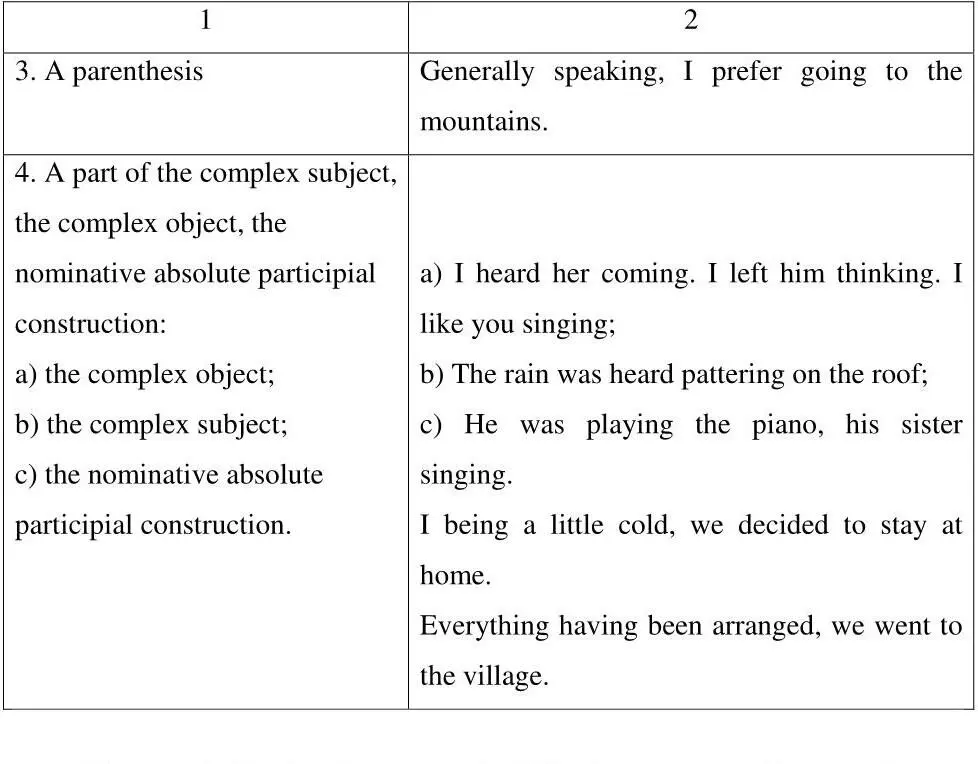
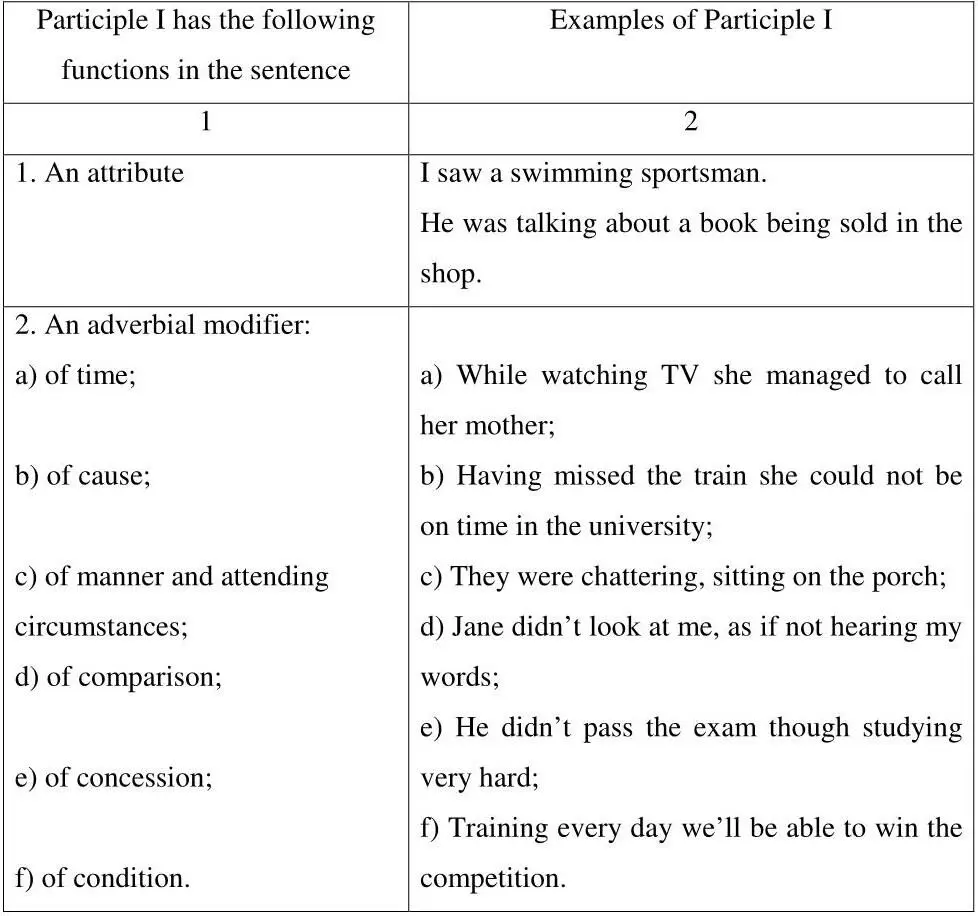
Exercise 1. Read and translate the following sentences. Pay attention to the function of participle I.
1. At last she left smiling and blowing a kiss from the door. 2. Desmonde came with me to all the matches returning jubilant, to our customary Saturday luncheon. 3. He drove very fast with one hand as though not carrying whether he lived or died. 4. Her aunts sat side by side on the sofa glancing at each other. 5. She stood for a moment fumbling in her bag for her key; then the door opened and vanished inside. 6. Chambers sat watching her till she was out of sight. 7. I walked down to the beach to bathe, and my uncle, having something to do in the town, walked part of the way with me. 8. Driffield worked at night, and Rosie, having nothing to do, was glad to go out with one or other of her friends. 9. I sank down on the sofa, suddenly realizing what had happened. 10. A tenant had made inquiries concerning the house, wishing to rent it.
Exercise 2. Complete the following sentences using participle I in the function of an attribute (A), an adverbial modifier (B), a parenthesis (C).
A. 1. He saw a man… 2. He came up to the child… 3. He went along the street… 4. The room was crowded with students … 5. There were people … 6. He caught sight of a girl… 7. He received a telegram … 8. Don't be very noisy, you'll wake up the child …
B. a) of time:
1. He wrote the letter… 2. When… I visited all the museums there. 3. While … you must be very attentive. 4… I realize that it was wrong. 5… I met a friend of mine.
b) of cause:
1. He kept silence … 2. He found the hotel without difficulty … 3. She didn't return with us … 4. He wasn't listening … 5… they rang again.
c) of manner or attending circumstances:
1. She walked down the hill … 2. He went out quickly … 3. He laughed embarrassed … 4. He stood there … 5. He leant on the windowsill…
d) of comparison:
1. He flung himself his arms round his granny's neck as if … 2. He looked round as if … 3. He raised his head as if … 4. He looked at her with entreaty as though…
e) of concession and condition:
1. Though … I could not help smiling. 2. Though … will be there in time. 3. Though … she tried to look calm. 4… you'll catch up with the group.
С. 1. I… you are the last person I expected to see here. 2… we have only his word for it. 3… it is not at all unusual. 4… it was a horrifying thing to happen.
Exercise 3. Read the following sentences and analyze complex objects with participle I.
1. I overheard Dale saying something about it. 2. Then she heard the stranger laughing quietly, and his footsteps came across the room. 3. He found her watering some plants; her face expressed her surprise at his unusual presence. 4. At his home, he let himself in, and to his surprise, found his wife coming towards him in the hall. 5. They could hear the Invisible Man breathing. 6. Mike saw him standing in the doorway. 7. Then her charming lace grew eager and glancing round Young Jolyon saw Bosinney striding across the grass. 8. She found herself waking from sleep and crying, but what she was weeping for she had no idea at all. 9. I saw him walking briskly through the crowd … 10. She could hear Bart moving about outside, whistling as he worked.
Читать дальше
Конец ознакомительного отрывка
Купить книгу
